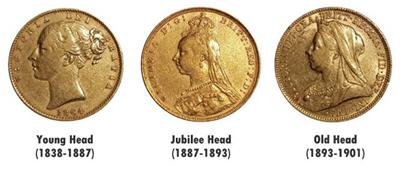Mintage: 2,473,537 (may include coins in sets)
Minted at The Melbourne Mint
Below are some coins currently being offered on eBay. As an eBay Partner, We may be compensated if you make a purchase.
Victoria's parents were Prince Edward, Duke of Kent and Strathern, and Princess Victoria of Saxe-Coburg-Saalfeld. She married Albert of Saxe-Coburg and Gotha, who later became known as Prince Albert. Victoria had nine children, the eldest son succeeding her as Edward VII.

Victoria posed for a number of head portraits, but there are generally three major variants: Young Head (1838-1887) by William Wyon, RA; Jubilee Head (1887-1893) by Sir Joseph Edgar Boehm and Old Head (1893-1901) by by Sir Thomas Brock.
Besides being minted in Britain, Sovereigns have been made in Australia (Melbourne, Sydney, Perth), India (then Bombay, now Mumbai), Canada (Ottawa) and South Africa (Pretoria) although these regional mints have not made sovereigns since 1932 (although India has produced some recently in a private mint partnership with the Royal Mint). The non-British coins carry a small mintmark ('S','M','P','I','C' or 'SA') just above the date. This 1890 Gold Sovereign Melbourne was minted at The Melbourne Mint.
The Obverse is the Monarch's head (Victoria) and the Reverse is most often St George and the Dragon, although other backs have been used and are of interest to collectors. The Reverse often gives the Sovs a new term, like "ShieldBacks".
Specifications for the Gold Sovereign
- Weight: 7.9881g
- Diameter: 22.05 mm
- Thickness: 1.52 mm
- Purity: 22 carat = 91.67% (11/12ths gold, 1/12th copper. Adding copper makes the coin more scratch and dent resistant)
- Gold Content: 113 grains = 7.3224 g = 0.2354 troy ounce
- Face value: £1 = 20 shillings
- Monarch: Victoria
History
Up until 1604 there was a coin called the English gold sovereign and in 1816 when there was the "Great Recoinage" the name was revived. At that time standard gold (22 carat) was valued at £46 14s 6d per troy pound; this meant a £1 coin needed to weigh 123.2744783 grains or 7.988030269 g. The weight is still the same today.
As a historical note: to maintain the Gold Standard, in 1816 the value of silver was set at 66 shillings for one troy pound and silver coins were only legal for denominations up to £2.
The first sovereigns carried the head of King George III and the famous George and the Dragon design by Benedetto Pistrucci (29 May 1783 – 16 September 1855), an Italian engraver who became chief medallist at the Royal Mint.
With high value coins such as the 1890 Gold Sovereign Melbourne, collectors and bullion investors often worry about forgeries but actually gold coins are very difficult to forge due to gold's unique properties of density and colour. Gold is extremely dense and to use another metal and gold-plate it would result in a coin that is under-weight, over-diameter or half as thick, something that would be spotted very easily. More difficult to spot would be a bullion coin melted down and re-cast as a highly collectable date, but an expert can usually tell these too. You should always use reputable dealers.








